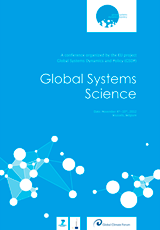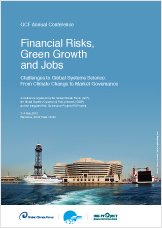Second Open Global Systems Science Conference
June 10-12th, 2013, Brussels, Belgium
Organized by the Global Climate Forum on behalf of the steering committee of the EU project GSDP in cooperation with the EU projects EUNOIA, FOC, INSITE, MULTIPLEX, NESS, and the G3M project, funded by the German BMU.
The study of problems as diverse as global climate change and global financial crises is currently converging towards a new kind of research – Global Systems Science. GSS is emerging hand in hand with the substantial advances in Information and Communication Technologies (ICT). The use of computer models, digitized data, and global virtual networks are vital for GSS, in the same fashion that GSS can become a trigger for truly disruptive developments in policy-oriented and socially useful ICT. Read more

 The aim of the Conference is to contribute to the development of Global Systems Science (GSS). The study of problems as diverse as global climate change and global financial crises is currently converging towards a new kind of research – Global Systems Science.
The aim of the Conference is to contribute to the development of Global Systems Science (GSS). The study of problems as diverse as global climate change and global financial crises is currently converging towards a new kind of research – Global Systems Science.
 The 21st century will be a period of unprecedented global challenges – instability of financial markets, global environmental change, large-scale demographic shifts, and more. The famous saying of Einstein’s – that we cannot solve problems with the thinking that generated them – is particularly relevant in the face of these challenges. There is an urgent need for new thinking about global systems, in particular about the main driving force of globalization: the world economy.
The 21st century will be a period of unprecedented global challenges – instability of financial markets, global environmental change, large-scale demographic shifts, and more. The famous saying of Einstein’s – that we cannot solve problems with the thinking that generated them – is particularly relevant in the face of these challenges. There is an urgent need for new thinking about global systems, in particular about the main driving force of globalization: the world economy.